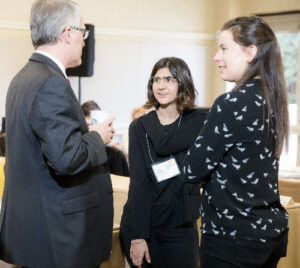
There you are, a graduate student in global health, when a 100-year pandemic comes along and puts your program and nearly everything else in the world on hold. What do you do? The Institute for Global Health Sciences’ (IGHS) PhD and MS students quickly decided that they would track emerging science about the SARS-Cov2 virus, focusing on epidemiology, non-pharmaceutical interventions and presentation patterns, to prepare healthcare providers in low- and middle-income settings to respond to the crisis.
Looping in some alumni, the students began identifying relevant journal articles and developing third-party synopses of the findings in context. Each week, they sent out those synopses in a newsletter. The newsletters were then archived online as PDFs.
There were two major limitations of this effort, though. First, the rudimentary archiving system didn’t allow researchers to search for information on a particular topic. Second, the synopses were intended to help people in a wide range of countries, but they were available exclusively in English.
The second of these problems quickly fell to IGHS PhD student Lucía Abascal, MD, MS, to address. A native of Mexico, Abascal began to translate the research summaries into Spanish in addition to helping write and review them. Eventually, an idea came to her: Why not collaborate with her peers in Mexico? In September, she applied for a grant from the Alianza UCMX program, which powers collaborations between the University of California and Mexican universities sharing research and expertise to improve public policy in both countries. When applying for a grant whose aims are as closely aligned with your project’s, the chances are good, and Abascal got the funding.
With the year-long Alianza UCMX grant, the UCSF team has developed a partnership with Mexico’s Autonomous National University (UNAM) that addresses both of the limitations of UCSF’s initial solo effort. Dania Nimbe Lima Sánchez, MD, PhD, a professor in the biomedical informatics department at UNAM, is co-leading the effort, now called Access COVID. She has pulled in medical students to help identify relevant research and write objective synopses in Spanish and English. They are also translating the English-only synopses.
As a specialist in bioinformatics, Lima Sánchez also tackled the search problem. The Access COVID website has a straightforward search feature that indexes all of the research.
“For me, the most impressive part of this project is that its completely student led,” Abascal said. “We wanted to do our part, and by doing this we are helping increase access to evidence that could help save lives.”